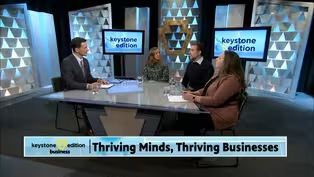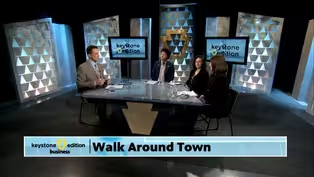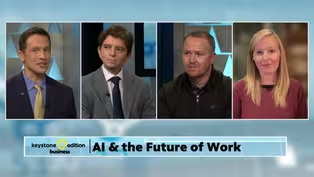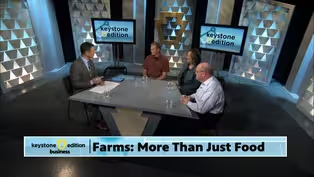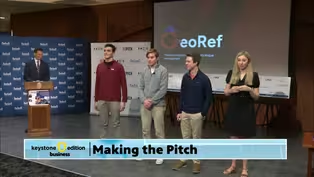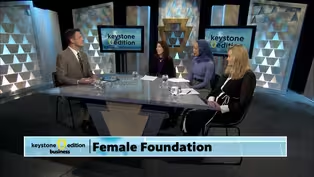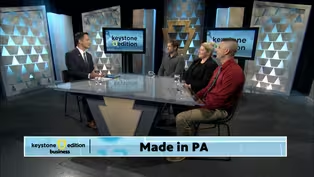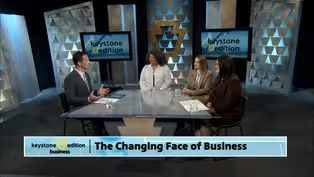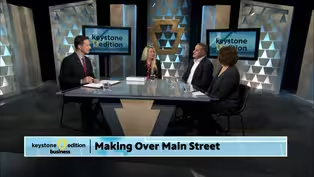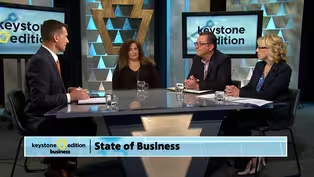Keystone Edition
Recession on the Horizon
11/14/2022 | 26m 45sVideo has Closed Captions
What constitutes a recession? What are the contributing factors? How does it affect you ?
Experts have been expecting the US to head into a recession since before the pandemic. Inflation numbers and other factors are not looking good. Keystone Edition Business looks into what constitutes a recession, what the contributing factors are, how it affects you and the businesses of the region, and what you can do about it.
Problems playing video? | Closed Captioning Feedback
Problems playing video? | Closed Captioning Feedback
Keystone Edition is a local public television program presented by WVIA
Keystone Edition
Recession on the Horizon
11/14/2022 | 26m 45sVideo has Closed Captions
Experts have been expecting the US to head into a recession since before the pandemic. Inflation numbers and other factors are not looking good. Keystone Edition Business looks into what constitutes a recession, what the contributing factors are, how it affects you and the businesses of the region, and what you can do about it.
Problems playing video? | Closed Captioning Feedback
How to Watch Keystone Edition
Keystone Edition is available to stream on pbs.org and the free PBS App, available on iPhone, Apple TV, Android TV, Android smartphones, Amazon Fire TV, Amazon Fire Tablet, Roku, Samsung Smart TV, and Vizio.
Providing Support for PBS.org
Learn Moreabout PBS online sponsorshipMore from This Collection
Steve Stumbris will talk with entrepreneurs, executives, and creators to get their insight on what it takes to make it in today’s modern marketplace, examining an array of topics including workforce development, professional development and regional commerce.
Thriving Minds, Thriving Businesses
Video has Closed Captions
Success isn't just about the bottom line – it's about the well-being of those who drive it (27m)
Celebrating Black-Owned Businesses
Video has Closed Captions
We'll examine the challenges the Black business community faces (26m 59s)
Video has Closed Captions
Many long-standing businesses have been in families for generations. (26m 59s)
Video has Closed Captions
What impact does improving a community's walkability and bikeability have? (26m 59s)
Video has Closed Captions
How can businesses leverage this new technology responsibly without costing jobs? (26m 58s)
Video has Closed Captions
Keystone Edition Business dives into agritourism and what it means to be a modern farmer (26m 59s)
Video has Closed Captions
Check out a program that may help some students get their ventures off the ground (54m 59s)
Video has Closed Captions
Keystone Edition Business delves into the challenges facing women in the workplace (27m)
Video has Closed Captions
Keystone Edition Business profiles some locally-owned and homegrown ventures. (26m 59s)
Video has Closed Captions
See immigrant-led businesses in our area, what it takes to get there, available resources (26m 59s)
Video has Closed Captions
Find out what business owners are doing to reinvigorate and reinvent downtown shopping (26m 59s)
Video has Closed Captions
Highlighting the current statistics and business trends in Northeastern and Central PA (26m 58s)
Providing Support for PBS.org
Learn Moreabout PBS online sponsorship- [Voiceover] Live from your Public Media Studios, WVIA presents "Keystone Edition Business".
A public affairs program that goes beyond the headlines to address issues in Northeastern and central Pennsylvania.
This is "Keystone Edition Business".
And now, moderator Steve Stumbris.
- Hi, I'm Steve Stumbris.
There's no denying that everyone is paying more for everything these days, from gas to groceries.
The question is, why, is it simply inflation, a restructuring of the economy in a post COVID recovery, or are we heading into a recession?
And if we are, what can we and businesses do about it?
We have experts here to explain what's going on, and the impacts we are feeling.
If you have questions, you can email us at keystone@wvia.org, or tag us on social with the hashtag #keystonebusiness.
But first, Paul Lazar explains what a recession is.
(swoosh effect) (gentle instrumental music) - [Paul Lazar] What is a recession?
A recession is a widespread, prolonged downturn in economic activity that can last for months, or even years.
The National Bureau of Economic Research determines whether the country's officially into recession, and takes many factors into account when doing so.
It looks at things like personal income, consumer spending, and industrial production.
What causes a recession?
According to Forbes, there are several factors that could contribute to an economic downturn.
One of those factors is a sudden economic shock, like the COVID 19 pandemic.
Other factors include excessive debt, too much inflation, and too much deflation.
Inflation is a steady increase in prices over time.
What are some signs of a possible recession?
Rising unemployment rates, a sudden stock market decline, and declines in customer confidence could all spell trouble for the economy.
A drop in customer confidence shows that people aren't willing to spend money.
What can be done to combat a recession?
The Federal Reserve will raise interest rates in an attempt to fight off inflation.
Raising rates will make mortgages and loans cost more, which means people will spend less, and inflation will slow.
But if the Fed raises those rates too quickly, it can trigger a recession if one isn't already underway.
For more information, head to wvia.org.
For "Keystone Edition Business", I'm Paul Lazar.
(upbeat instrumental music) - I'd like to introduce our experts here to discuss the possibility of an upcoming recession.
Dr. Matthew Rousu joins us from Susquehanna University, where he's the dean of the Sigmund Weis School of Business.
Next, Lisa Hall Zielinski is the director of the University of Scranton's Small Business Development Center.
Finally, Bob Durkin, the president of the Greater Scranton Chamber of Commerce is also here.
So Matt, Lisa.
Bob, thank you so much for joining us tonight, really looking forward to our conversation.
And I have a series of questions, turning to each of you to hear about your perspective, and sharing your expertise.
So Matt, I'd like to start with you.
We heard from Paul about what's the basic definition?
What are the indicators that a recession is possibly coming?
Could you share more about what are some of the less obvious signs of recession?
What are you seeing?
- Sure, sure.
In the definition of a recession in the past year is something that has been debated more than I've ever heard debated, and I've taught economics for about 20 years now.
So it's a prolonged period where you have negative economic activity.
Typically, it's associated with an increase in the unemployment rate.
What is making this year interesting among, what could we expect with COVID, the past three years have been really interesting.
Is there's been a decrease in gross domestic product, which is often the definition, two consecutive quarters where gross domestic product decreases, but unemployment has not gone up.
Normally, the unemployment rates increase.
What we've seen instead this time though, is because of the high inflation rates, wages haven't kept up, so the average worker is earning about two to 3% less.
So is this a recession right now?
We won't find out until the NBER declares it.
I don't know, and I don't know that it matters necessarily, are they gonna say it is or not.
But it's certainly by the definition of the gross domestic product dropping two quarters in a row.
In our lifetimes, anytime that's happened, it's always been declared a recession.
- We have different factors which aren't fitting that typical mold.
- [Matthew Rousu] Correct.
- And you talked about unemployment rates.
- [Matthew Rousu] Yeah.
- Perhaps it would be interesting to talk about how our region compares to national.
- Sure.
- And of course, we'll hear about a recession being something that's a national occurrence.
- [Matthew Rousu] Yeah, yeah.
- [Steve Stumbris] But what are you seeing at local, state?
- [Matthew Rousu] Sure, sure.
- [Steve Stumbris] National unemployment?
- Well, the national level's 3.7%, which is historically low.
I think it might have hit 3.5% a couple years ago, which is the lowest in, maybe in our lifetimes.
Even still, 3.7 is incredibly low.
At the state and the local level, it's just a notch above 4%, which is still really incredibly low for the long-term.
I mean, 4% unemployment means only one in 25 individuals who want to be working at any given time aren't employed.
There's a long time economists thought the natural rate of unemployment, just the percentage of people had to be five or 6%.
Just because new people are coming onto the job market, people would lose jobs, employers would ask people to leave jobs, layoffs and so forth.
It's a little higher in Pennsylvania in the local area, but it's still quite low.
- Okay, now, Lisa and Bob, I wanna invite you to also share your perspective.
Perhaps Bob, from your role in interacting with many, many members of the chamber.
What are they seeing in terms of, well, there's some anxiety, sure, about recession, but what are you hearing from members of the chamber?
- So the Greater Scranton Chamber of Commerce has 1500 members of all sizes, of course, but for the most part, small business.
More than 80% of our chamber members have fewer than 25 employees, and a substantial number of them would be even less than that, probably 10.
We were talking about this briefly before.
In an odd way, I think that while the business people were certainly gonna pay attention to the news, read the newspaper, perhaps, hopefully watch the show.
For the most part, the average small business person is not focused on this.
The average small business person is doing their job, and so what the numbers say really are not necessarily, I'm not saying that most or not all are paying attention to that.
I think it becomes a question of what are the key elements that affect them.
So certainly inflation affecting what they're doing, the workforce issues, which predated COVID, by the way.
The challenge of filling so many jobs that we've had in this area.
And it's one hand, one side of it, I can tell you, I mean, I hear from them all the time, almost every day.
We have job opportunities, we just can't find the bodies.
- [Steve Stumbris] And that's gotta be related to that unemployment rate.
- Yeah.
- The market is tipped in favor of job seekers.
There are more opportunities than job seekers.
- Yeah, so I would leave that to leave it to Matt to figure out how those variables play against each other in different ways.
But to say that there's a recession, in some instances doesn't really much matter to a small business person.
Now, Lisa, with the focus through a small business development center on the development of business plans are the kinds of things that we would recommend for our small businesses.
We want them to make sure that they're doing the kinds of things, that they're monitoring the key elements of their businesses.
And if they're doing that, then they're doing all they can do.
And can only do what's within your reach, and maybe it'd be best if people to learn more about the great work that Lisa, and you, and others in the small business development centers are doing, and 'cause it's critical.
'Cause when someone touches base with us, the Greater Scranton Chamber of Commerce, they wanna start a business, they wanna grow their business, we're likely to send them to Lisa.
- Well, Lisa, let's hear from you about that.
As someone who, per say, a small business owner who is concerned about what may be coming, and some of these factors that they're feeling in their business.
- [Lisa Hall Zielinski] Sure.
What is the first thing that you and others at the SBDC, what are those conversations like nowadays?
- Sure, so at the Small Business Development Center, we're providing individual consulting with people.
And it really depends on each business, on each person's situation.
Our conversations really depend on what they have going on.
But we're talking with people, and trying to look at do they have a business plan?
What kinds of things have they figured out already, what kinds of things need to be revisited?
During these kinds of times, you're looking at elements of your business plan, like your marketing plan, your target market.
Those things that you think you figured out maybe five years ago or something, when you did your plan, but they need to be revisited.
And so we're talking with people trying to dig into their specific situations, and see what needs to be addressed.
- Great, so you talked about marketing plan.
And I think key in that is understanding what your customers want.
- [Lisa Hall Zielinski] Sure.
- What they need, and understanding the difference between that.
So I think now is a great time to hear, I know WVIA went out into the community and interviewed some individuals about what their perspective is.
So we wanna wanna bring that in, and what WVIA heard.
They wanted to know what kind of expenses they might continue paying for.
What types of businesses they might not engage the services and products of quite as much.
So wanna share that, and then following that, go into more, what should businesses be really be listening to in that?
So these are some of the compromises that people are, and aren't willing to make as they look into a recession possibly coming ahead.
(swoosh effect) (gentle instrumental music) - Well, I would still splurge on my dog.
My dog, and his health, and his favorite foods and treats.
And what I actually did cut back on even before the recession, but I'm looking at my bills.
I'm looking at, for example, the phone bill, and cutting back there.
I switched to a much, much less expensive carrier.
So looking at ways like that, turning the thermostat down.
- I would probably continue to splurge on food.
I don't buy food, I cook my own food, but I try to cook good food 'cause I have a chronic illness.
Then I would probably cut on warm showers and heat, and just put on extra layers.
- Probably going to the movies, little things like that.
But I know date night is important with myself and my girlfriend, so there still has to be that once a week.
Because without it, we can't just be miserable, even if there's a recession coming on and all that.
(swoosh effect) (gentle instrumental music) - Let's talk about what a business should be listening to when they're talking to customers.
And Lisa, let me ask you about, as businesses are looking ahead, what kind of changes should they be making in their operations right now to be more resilient?
- Sure, so even reflecting back on the pandemic, some of the things that businesses did during that time.
When you look at the pandemic, and you look at tough times.
Retail businesses struggle, as do restaurants and hospitality businesses, and some of the more luxury type businesses, right?
So I'd imagine some of the people might comment on things like that, pulling back on eating out and things like that.
So we look at what people did during the pandemic, and we saw great examples of restaurants, different types of businesses being really creative, right?
Listening to their customers, which is really important.
You get so stuck in doing the things that you do in the way that you want to do them, and sometimes we forget to listen to our customers.
And so listening to customers, what do they want?
How do they want it, and how can you be creative and flexible to provide that?
Our smallest businesses, and our medium sized businesses, they're in a great position to be able to be flexible.
Some larger businesses can't do that.
They can make changes, they can make quick adjustments when they know what their customers are looking for.
So that's really important to be listening, and to be able to filter out.
You're gonna get a lot of feedback from people, but you wanna be able to filter out what are the things you can do things with, and what are the things you might wanna, some of the feedback you might not wanna do something about.
- Thanks, Lisa, so I wanna steer the conversation to, from the very smallest level, the very smallest businesses and how they are being impacted.
Zoom out to types of businesses, or industries, and in our observations through the pandemic.
What types of businesses weathered that very well?
And we might forecast these are businesses that are more or less recession proof.
So Matt, I'd like to ask you.
Bring a little bit of the theory of what types of businesses are gonna withstand a recession best?
- Yeah, well, when incomes drop overall, economists like to classify goods into categories.
Some products are considered, well, luxury goods because, well, they're luxuries, we're not very creative as economists.
The luxury goods are, as incomes rise, you buy more of a luxury good.
Or conversely, as incomes drop, the amount of a luxury good you purchase drops disproportionately.
So luxury industries tend not too fair as well during a recession, or when incomes are dropping.
Conversely, necessary goods, or even what economists call inferior goods.
A necessary good, it's a product where you buy more.
A drop in income is not going to affect the purchase of it because it's a required product.
An inferior good, you might actually buy more.
So there are some cases where products are less expensive, alternatives might actually see a boost.
- [Steve Stumbris] With the shift.
- When incomes drop, correct.
- Now, Bob, I wanna ask you to bring the voice of the members of the chamber.
Similar topic, those that weathered the pandemic well.
are they ready now, or are there things that they still need to do, because this is a different stress that they may be experiencing?
- Well, I think it's a really interesting question, that I would look at from the standpoint of, well, during the pandemic, because the greater Scranton Chamber of Commerce, among our various divisions, one of them is Metro Action Small Business Lending.
Now, in the early stages of the pandemic, because we are a community development finance institute, CDFI, it's a certification.
That positioned us to be the distributors, and to provide technical assistance for a lot of the grants.
Literally, probably close to a thousand small businesses over a nine county area of Northeastern Pennsylvania, 14 million worth of grants distributed.
I bring it up in this context.
When doing so, they were not just handed a check.
They had to answer questions, they had to show their tax returns, they had to show other financial information.
And it really shown a light on how so many businesses, big and small, really, are not following what would be generally accepted business practices.
Many of them didn't have business plans, and so the result is for the businesses, shining that light on them helped them to recognize where their weaknesses are.
Lisa mentioned it before, a number of them, and I think the smart ones, and also the ones that just innately or inherently have a certain skill set did a very good job of attacking, moving in different directions.
So you had issues with accounting, you had issues with marketing, you had issues with technology.
And so many of them really have done a great job, and I wouldn't necessarily define a particular sector, business sector, it is just different business people.
And what's followed for us, we've rolled out a COVID recovery loan program.
The focus of which was not to worry about what happened in the past, but rather to use these resources.
Very low interest rates, small amounts, $25,000, up to $25,000 loans for three years, 1% interest.
I'm sure that now that everybody's gonna be calling us on this, but we've used most of that capital.
I think that that ties into this, because those businesses, and there were scores of them that did get those grants, or those loans rather, they were the ones that grew during the COVID phase.
They saw where their problems were, and they were prepared to use these dollars to move positively forward to address some of those gaps.
- Okay, now, Lisa, let's keep the conversation going about pandemic changes.
And Bob, you talked about different technology, different practices, going back to the basics, all of these things that business owners turn to to withstand the stresses of the pandemic.
What of those changes are gonna be most important?
Or what topics should business owners be going back to, or turning to, or emphasizing that they may have started to touch on during the pandemic?
- Sure, so Bob's point about gathering financials, and tax returns, and all those kinds of things, we had people that had very little experience doing that.
And so they did get a lot of experience doing that for the various programs.
I would say to continue to really take a look at finances, and understand what your debts are.
I mean, sometimes when you start talking like this, people wanna pull the covers over their heads.
But really, the best thing you could do is just hit it head on, really take a look at what's in front of you.
Have conversations with lenders, and organizations like chambers and other lenders that might be able to do something for you.
Don't just let the bills pile up without paying them.
That's one thing that people can continue to look at.
And I really think, just taking advantage of some of the resources that we have to offer, having conversations about the specific business.
Where there might be even new markets for business that you haven't considered before.
Things like international business, government contracting.
Those types of things are things that people usually think, "Oh, not my business."
But truly, many businesses have opportunities there that they haven't even explored yet, and that's something that we can help them do at the SPDC and with our partners.
- That's one of the things I love about a public affairs show like this, is helping people discover that there are resources out there, and encouraging that connectivity across the community.
Become a member, reach out to an SPDC, learn, and learn, and learn.
- I think Lisa, several times, has hit on the idea of knowing your customers.
So whether it's you're assessing, whether you're looking at specific customers, or sets of customers from different groups or settings.
By doing so, see who your best customers are, who your strongest, most important customers are, and pay a great deal of attention to them.
But also, that should be a bit of an insight to say, "Okay, I'm"... We always use the example, so the pizza, local pizza shop.
We've got some larger business that comes every Friday and buys 10 pies.
Okay, well, they're one of your best customers.
Well, guess what, there are others like them.
So take advantage of that, learn about your customers, the ones that are strong.
And go out and start to market, and see if you can't bring others within that same sort of standing, to strengthen your customer base.
- So let's talk about employees, and how they're affected.
So I wanna talk about what businesses can do to safeguard their employees.
What kind of things can they do to keep employment?
Well, we've got a very low unemployment rate.
How important is that to maintain going forward?
So Matt, can you talk about employees in business during a downturn of an economy?
- Sure, and once again, a downturn, this is a strange downturn, in that the unemployment rate is so incredibly low.
I would think one of the top things that firms could do to attract talent, one is of course, more money is always better, right?
But there are limits on that.
Employers are looking for a good work environment, and opportunities to train for the next level.
As somebody who started the proverbial pizza shop, it wasn't a pizza shop, but started at a restaurant.
That's where I started my working career, is as a restaurant way many, many, many years ago, but the skills that you can gain even as a younger person at some of, in pretty much any job could translate on.
So I think firms that offer training and development, so individuals could either succeed and do the best they want in that particular job, or perhaps give opportunities for professional growth to move on the next job.
Those are the firms I would think that will do best moving forward.
- Now, Lisa, I know that you are involved in a program that gives some of those youngest employees an entry, sort of that first taste of the work environment.
Could you talk a little bit about that, the programming through the SPDC and internships?
- Sure, so at the SPDC, we have access to, really very bright college students.
Whether it be through our office, we have teams of students who can help assist small businesses, but they also can hire their own interns through the small business internship initiative.
And that's interns across the region.
And that's helping businesses really host valuable internships, they're paid internship opportunities.
They can often gain a lot of benefit for their business using what students are learning in the classroom, and their energy, and their kind of fresh approach to things.
They can come in and really help a small business, and so that can definitely be something someone can pursue.
And we do have a partnership with the Greater Scranton Chamber of Commerce for the Small Business Internship Fund, where businesses can receive matching funds to host interns too.
- Chamber members in good standing.
That is to say for at least the last year.
When they qualify, again, we partner with the SBDC to filter these opportunities.
So small businesses can use not only the cost savings by being a chamber member, and using that program.
But I think one of the most important things that Lisa said before is what these young people bring to the table.
So many times, and we have multiple interns with the chamber itself.
So often these young people come in, and especially in the areas of technology, they know more than you know.
I mean, yes, it's a learning experience for the student.
but it's a two-way street, and it's a very positive experience.
And so we strongly encourage our members and others to take advantage of it.
It's also an opportunity in the long-run, and I'll get a little off the subject, but it's to connect with individuals, particularly intelligent students, well educated students, that there is a connection back here.
Get that internship, and they get their feet on the ground in Northeastern Pennsylvania, hopefully they're gonna stay here.
- Yeah, and one, being at a business school where we have a student's intern, everything you say rings true.
The other benefit, I think for both firms, and worker, and the the students is it's a trial run.
And hiring can be risky, it's a lot less risky if you've worked already with say, six to eight, to 10 to 12 weeks with some individual, both for the student thinking about a job, and also for the employer.
- Now, Matt, I really enjoyed visiting Susquehanna University recently, of course.
- Yeah, it was great to have you.
- And got to connect with so many of your students.
And a driving theme throughout a lot of those conversations was entrepreneurship.
- [Matthew Rousu] Yes.
- They are looking to create something of their own.
So we have just under two minutes to close on what's ahead.
So even in the face of uncertain economic conditions, even through a pandemic, entrepreneurs are optimists and they're looking for opportunities.
What are you seeing as opportunities for entrepreneurs?
- Well, COVID has changed everything, right?
It's up there, if I would be exaggerating if I could say I know the next opportunities.
I'd be going out and trying to do them, right?
And earning the money myself.
But what I've heard and learned just last week, when we were at a panel, it's a great time to try new business.
And entrepreneurship, economists will often discuss, it's really one of the drivers of economic growth that we've seen in the region, the state, and the country.
- So similarly, Lisa, what are you saying to entrepreneurs as they're saying, "I wanna start."
Are you saying, "Well, maybe now's not a good time", or what?
- I'm saying, it's always a good time to explore your ideas, to work on some of the things we talked about before.
Business planning, really getting a good, solid approach to what you're going to do, so always a good time to explore.
- Always a good time to explore that opportunity.
And we're gonna close out with that.
Thank you, Matt, Lisa, and Bob.
Really appreciate you joining me here as guests tonight, and participating in this great conversation.
Thanks again for joining us.
For more information on this topic, please visit wvia.org/keystonebusiness.
And remember, you can rewatch this episode on demand anytime online, or on the WVIA app.
For "Keystone Edition", I'm Steve Stumbris.
Thanks for watching.
(upbeat instrumental music)
Recession on the Horizon - Preview
Preview: 11/14/2022 | 30s | Watch Monday, November 14th at 7pm on WVIA TV (30s)
Providing Support for PBS.org
Learn Moreabout PBS online sponsorship
- News and Public Affairs

Top journalists deliver compelling original analysis of the hour's headlines.

- News and Public Affairs

FRONTLINE is investigative journalism that questions, explains and changes our world.












Support for PBS provided by:
Keystone Edition is a local public television program presented by WVIA
